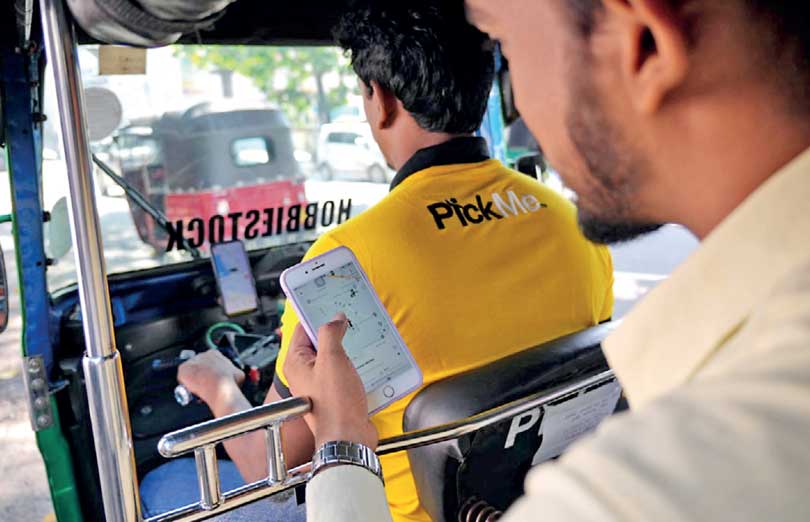Tuesday Feb 17, 2026
Tuesday Feb 17, 2026
Thursday, 30 January 2025 14:04 - - {{hitsCtrl.values.hits}}

As the world hurtles towards a digital future, segments of the population in emerging economies like Sri Lanka remain reluctant to embrace it. This resistance is particularly evident in traditional industries such as transportation, especially local taxi operators who are wary of ride-hailing apps. They fear that digital platforms disrupt local economies, reducing earnings, and eroding their control over long-established markets. While these concerns are understandable, they overlook the opportunities that digitisation brings to enhance livelihoods, expand access to markets, increase efficiencies and create a fairer playing field for all.
Revolutionising through tech
Contrary to fears of job loss, digitalisation often transforms jobs rather than eliminating them. Ride-hailing platforms, for instance, have expanded markets by making transportation more accessible, affordable, reliable, and convenient. Traditional taxi operators can benefit by joining these platforms, gaining access to a broader customer base, streamlined bookings, and transparent pricing mechanisms.
In many regions, drivers who initially resisted ride-hailing services found themselves earning more once they integrated with the platforms. The reduction in idle time, the ability to plan routes efficiently, and the assurance of secure payments help boost incomes and operational efficiency.
Today’s consumers value convenience, transparency, and safety — attributes that digital platforms excel at providing. Apps allow customers to book rides quickly, see upfront pricing, and track their journeys in real time, features that many traditional services lack. This shift in customer expectations illustrates the need for modernisation. If traditional service providers fail to adapt, they risk losing customers to digital ride-hailing competitors entirely.
Furthermore, ride-hailing apps promote accountability by incorporating features like driver ratings, background checks, and route tracking. These measures build trust and ensure a safer experience for passengers while creating a professional framework for drivers.
Education matters
Resistance to digitalisation often stems more from a lack of familiarity with technology than from outright opposition. Therefore, while the Government’s push toward digitalisation is commendable, it must be complemented by a robust educational initiative. Equally important is raising awareness about the broader impacts and byproducts of digitalisation, such as the rise of the shared economy and its potential benefits.
This educational framework should act as a bridge, connecting digital adopters with those who are still rooted in traditional, analogue systems, building trust and understanding that will ensure easy transition for all stakeholders.
Workshops and training sessions aimed at teaching those unfamiliar with digital tools how to navigate and integrate into the ecosystem can play a pivotal role. These initiatives would foster inclusivity, empower individuals with essential skills, and enable communities to compete on equal footing in an increasingly digital world.
Beyond individual benefits, digitalisation contributes to larger economic growth. It helps urban development, enhances infrastructure, and attracts tourism and investment. Tourists, for instance, often rely on digital platforms to navigate unfamiliar cities. A lack of such services can hinder a city’s ability to cater to international visitors, ultimately affecting its economic prospects.
Role of the Government
The road to digitalisation requires a collaborative approach that balances innovation with the needs of traditional stakeholders. Governments must implement fair regulations, corporations must provide inclusive solutions, and communities must embrace change as an opportunity for growth.
Sri Lanka, a country deeply rooted in its ancient culture, often struggles to strike a balance between preserving tradition and embracing modernity. This tendency to cling to antiquated ideas about what should or shouldn’t be done can hinder progress and make adaptation to new technologies seem unachievable.
This presents a clear opportunity for Non-Governmental Organisations (NGOs) and community leaders to step up. These entities can initiate social engagement programs aimed at educating communities resistant to change. They can highlight how digital tools complement, rather than replace traditional practices, ensuring that individuals feel empowered rather than threatened by modernisation.
Bridging socioeconomic gaps
As digital identity systems gain global prominence, Sri Lanka is on the cusp of entering this new arena. Connecting citizens to the digital world is no longer optional but essential. In the near future, everyday activities such as banking, shopping, and land registration will be governed by one’s digital footprint. Delaying the adoption of these tools risks creating a digital divide that could prove more damaging than the socioeconomic gaps between the so-called “haves” and “have-nots.”
For traditional service providers, the message is clear: adapting to digital tools isn’t a threat — it’s an opportunity. By integrating technology into their operations, they can increase efficiency, expand their customer base, and thrive in a world that is rapidly evolving.
Sri Lanka’s journey toward digital transformation requires both vision and action. Honest brokers — whether NGOs, policymakers, or business leaders — must guide this process, ensuring that every segment of society is equipped to embrace the future while honouring the past.